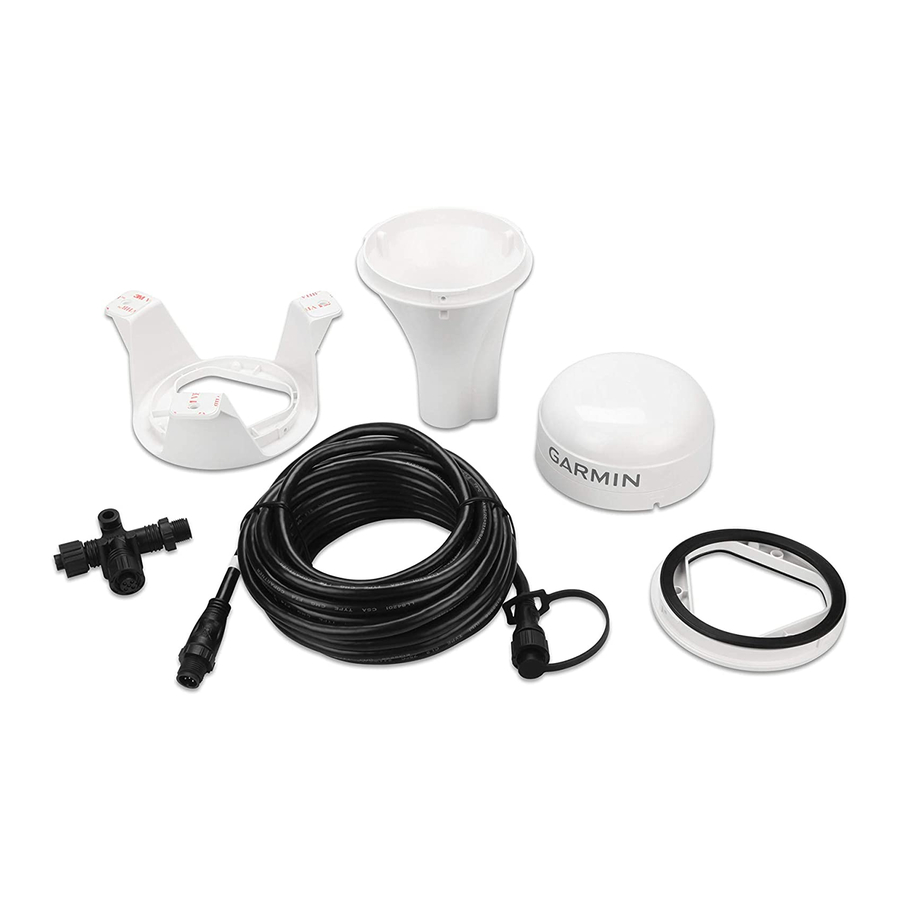- ページ 3
舶用機器 Garmin GPS 19x NMEA 2000のPDF インストレーション・インストラクションをオンラインで閲覧またはダウンロードできます。Garmin GPS 19x NMEA 2000 4 ページ。 Gps antenna
Garmin GPS 19x NMEA 2000 にも: 取付説明書 (49 ページ), インストレーション・インストラクション (4 ページ)

4
Adhere the under-deck mounting bracket to the
mounting surface.
5
Secure the under-deck mounting bracket to the
mounting surface with screws.
6
Connect the cable to the antenna
7
Route the cable away from sources of electronic
interference, and connect it to your NMEA 2000
Connecting the Antenna to Your
NMEA 2000 Network
If you do not have an existing NMEA 2000 network,
you must install a NMEA 2000 network on your boat.
.
The antenna is packaged with a NMEA 2000
T-connector and a NMEA 2000 drop cable. You will
use these two components to connect the antenna to
your existing NMEA 2000 network.
1
Determine an appropriate location to connect
the antenna
to your existing NMEA 2000
backbone
.
2
Disconnect one side of a NMEA 2000
T-connector
from the backbone nearest to the
location where you want to connect the antenna.
If you need to extend the NMEA 2000 backbone,
connect an appropriate NMEA 2000 backbone
extension cable (not included) to the side of the
T-connector you disconnected.
3
Connect a T-connector (included) in the NMEA
2000 backbone.
4
Route a drop cable (included)
19x antenna to the top of the T-connector you
added to your NMEA 2000 network.
If the included drop cable is not long enough, you
can add a drop cable extension up to 13 ft. (4 m).
If more cable is needed, add an extension to your
NMEA 2000 backbone, based on the NMEA 2000
guidelines.
Chartplotter Software
To ensure compatibility with the antenna, upgrade
your Garmin chartplotter or display device with the
Configuring the Antenna
To access the NMEA 2000 configuration menu
on your Garmin display device, consult the
documentation provided with your display device.
.
from the GPS
1
While viewing the NMEA 2000 configuration
menu on your display device, select the antenna.
2
Select Review > WAAS/EGNoS.
3
On a Garmin chartplotter, select on or off.
About the Speed Filter
The speed filter setting on the antenna can help
reduce unnecessary drift-alarm triggers as well as
potentially sporadic position information. The speed
filter averages the data provided by the antenna to
provide smoother position data updates. The speed
filter is most helpful when stationary or in low-speed
situations.
Setting the Speed Filter
1
While viewing the NMEA 2000 configuration
menu, select the antenna.
2
Select Review > Speed Filter.
3
Choose from the following options:
• off—position information from the antenna is
provided to the NMEA 2000 network as it is
gathered.
• on—position information from the antenna is
gathered and averaged before it is provided
to the NMEA 2000 network. Select the
interval at which the position information is
gathered.
• Auto—the speed filter toggles on in low-
speed situations and toggles off in high-speed
situations.
Refreshing GPS Satellite Acquisition
In some situations, if you have moved the boat many
miles without using the antenna, for example, you
can force the antenna to reinitialize and find your
current position.
1
While viewing the NMEA 2000 configuration
menu, select the antenna.
2
Select Review > Auto Locate.
3
Wait for the antenna to acquire satellites.
Restoring Factory Default Settings
You will lose all custom configuration settings when
you restore factory default settings.
1
While viewing the NMEA 2000 configuration
menu, select the antenna.
2
Select Review > Factory Defaults.
Enabling GLoNASS Satellites
You can configure the antenna to acquire GLONASS
satellites.
1
While viewing the NMEA 2000 configuration
menu on your display device, select the antenna.
2
Select Review > Generic Config.
3
Enter "GLoNASS=1;RESEt".
4
Select Done.
The antenna resets.
Disabling GLoNASS Satellites
1
While viewing the NMEA 2000 configuration
menu on your display device, select the antenna.
2
Select Review > Generic Config.
3
Enter "GLoNASS=0;RESEt".
4
Select Done.
The antenna resets.
